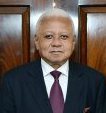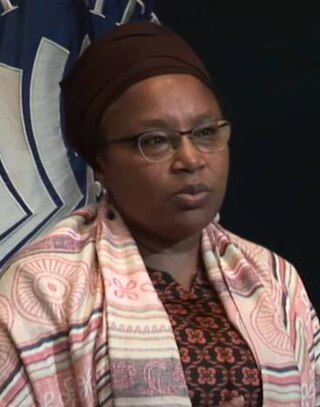
International criminal law (ICL) is a body of public international law designed to prohibit certain categories of conduct commonly viewed as serious atrocities and to make perpetrators of such conduct criminally accountable for their perpetration. The core crimes under international law are genocide,war crimes,crimes against humanity,and the crime of aggression.

An under-secretary-general of the United Nations (USG) is a senior official within the United Nations System,normally appointed by the General Assembly on the recommendation of the secretary-general for a renewable term of four years. Under-secretary-general is the third highest rank in the United Nations,after the secretary-general and the deputy secretary-general. The rank is held by the heads of different UN entities,certain high officials of the United Nations Secretariat,and high-level envoys. The United Nations regards the rank as equal to that of a cabinet minister of a member state,and under-secretaries-general have diplomatic immunity under the UN Charter.
The responsibility to protect is a global political commitment which was endorsed by the United Nations General Assembly at the 2005 World Summit in order to address its four key concerns to prevent genocide,war crimes,ethnic cleansing and crimes against humanity. The doctrine is regarded as a unanimous and well-established international norm over the past two decades.
Gregory H. Stanton is the former research professor in Genocide Studies and Prevention at the George Mason University in Fairfax County,Virginia,United States. He is best known for his work in the area of genocide studies. He is the founder and president of Genocide Watch,the founder and director of the Cambodian Genocide Project,and the Chair of the Alliance Against Genocide. From 2007 to 2009 he was the president of the International Association of Genocide Scholars.

Mukesh Kapila M.D. CBE is an author,medical doctor,professor,and a senior humanitarian.

Francis Mading Deng is a South Sudanese politician and diplomat. He played an important role in advancing a Responsibility to Protect (R2P) when he was the UN's Special Representative on Internally Displaced Persons (1992–2004).
The Kenya National Commission on Human Rights (KNCHR) is an autonomous national human rights institution,established by the Kenya National Commission on Human Rights Act,2011. It is a successor to the body of the same name established by an earlier Act of Parliament in 2002. The original KNCHR became operational in July 2003,and following the promulgation of the Constitution of Kenya in August 2010,was legally reconstituted as the Kenya National Human Rights and Equality Commission. The 2011 legislation restructured the body,assigning the equality function to a new National Gender and Equality Commission and reestablishing the name of the KNCHR.

Hassan Bubacar Jallow is a Gambian judge who has served as Chief Justice of the Gambia since February 2017. He was the Prosecutor of the International Criminal Tribunal for Rwanda (ICTR) from 2003 to 2016,and the Prosecutor of the International Residual Mechanism for Criminal Tribunals (IRMCT) from 2012 to 2016,both at the rank of United Nations Under Secretary-General. He served as Minister of Justice and Attorney General from 1984 to 1994 under President Dawda Jawara.

William Anthony Schabas,OC is a Canadian academic specialising in international criminal and human rights law. He is professor of international law at Middlesex University in the United Kingdom,professor of international human law and human rights at Leiden University in the Netherlands,and an internationally respected expert on human rights law,genocide and the death penalty.

United Nations Security Council resolution 935,adopted unanimously on 1 July 1994,after recalling all resolutions on Rwanda,particularly 918 (1994) and 925 (1994),the Council requested the Secretary-General Boutros Boutros-Ghali to establish a Commission of Experts to investigate violations of international humanitarian law during the Rwandan genocide.

Mohamed Chande Othman is a Tanzanian lawyer and a former Chief Justice of Tanzania.
The term international framework of sexual violence refers to the collection of international legal instruments –such as treaties,conventions,protocols,case law,declarations,resolutions and recommendations –developed in the 20th and 21st century to address the problem of sexual violence. The framework seeks to establish and recognise the right all human beings to not experience sexual violence,to prevent sexual violence from being committed wherever possible,to punish perpetrators of sexual violence,and to provide care for victims of sexual violence. The standards set by this framework are intended to be adopted and implemented by governments around the world in order to protect their citizens against sexual violence.
The Crimes Against Humanity Initiative is a rule of law research and advocacy project of the Whitney R. Harris World Law Institute. Started in 2008 by Professor Leila Nadya Sadat,the Initiative has as its goals the study of the need for a comprehensive international convention on the prevention and punishment of crimes against humanity,the analysis of the necessary elements of such a convention,and the drafting of a proposed treaty. To date,the Initiative has held several experts' meetings and conferences,published a Proposed Convention on the Prevention and Punishment of Crimes Against Humanity,and resulted in the publication of an edited volume,Forging a Convention for Crimes Against Humanity,by Cambridge University Press. The draft treaty is now available in seven languages. The UN International Law Commission produced its own,similar,set of Draft Articles on the Prevention and Punishment of Crimes against Humanity,and a proposed treaty is now being debated by governments around the world.

Prevention of genocide is any action that works toward averting future genocides. Genocides take a lot of planning,resources,and involved parties to carry out,they do not just happen instantaneously. Scholars in the field of genocide studies have identified a set of widely agreed upon risk factors that make a country or social group more at risk of carrying out a genocide,which include a wide range of political and cultural factors that create a context in which genocide is more likely,such as political upheaval or regime change,as well as psychological phenomena that can be manipulated and taken advantage of in large groups of people,like conformity and cognitive dissonance. Genocide prevention depends heavily on the knowledge and surveillance of these risk factors,as well as the identification of early warning signs of genocide beginning to occur.
Bongani Christopher Majola is an advocate of the High Court of South Africa,an academic,human rights scholar,and the previous Assistant Secretary-General of the United Nations (UN) International Criminal Tribunal for Rwanda (ICTR). He currently serves as the chairperson of the South African Human Rights Commission.

Abubacarr Marie "Ba" Tambadou is a Gambian lawyer and politician who is currently the Registrar of the International Residual Mechanism for Criminal Tribunals,an international court founded by the United Nations Security Council. From 2017 to 2020,Tambadou served as Minister of Justice and Attorney General in Gambian President Adama Barrow's cabinet.

Alice Wairimu Nderitu is a Kenyan national serving since November 2020 as the United Nations Under-Secretary-General and Special Adviser on the Prevention of Genocide to United Nations Secretary-General António Guterres.
Wairimu is a name of Kikuyu origin that may refer to:
Nderitu is both a given name and a surname. Notable people with the name include:











